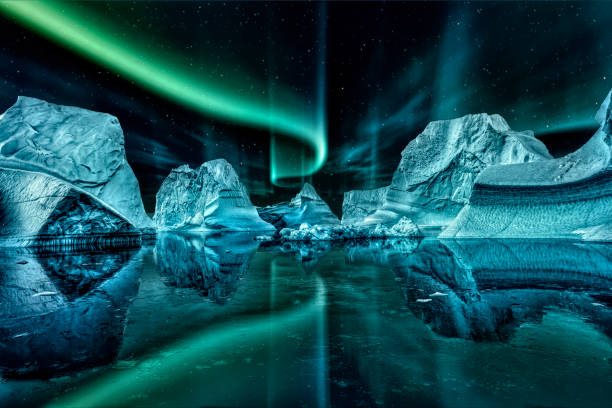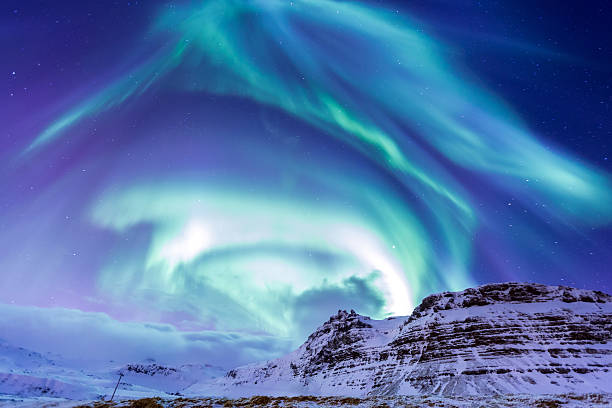 once held a session in a computer lab for students learning English. It was a poetry lesson, and we called up pictures of the northern lights for inspiration. Each screen had a different picture of the northern lights. It was very satisfying, although it was in a windowless computer lab and far from the great outdoors.
once held a session in a computer lab for students learning English. It was a poetry lesson, and we called up pictures of the northern lights for inspiration. Each screen had a different picture of the northern lights. It was very satisfying, although it was in a windowless computer lab and far from the great outdoors.
LIGHTS
Since today is the Feast of the Epiphany, a word which means a sudden manifestation, I thought, why not look at the sudden manifestation of the aurora borealis?










JOYCE
The Irish writer, James Joyce, has a supremely evocative story called “The Dead,” in his story collection called The Dubliners, published in 1914, which I just learned may have been set on this day, the Feast of the Epiphany. There’s a party, in Dublin, with a delicious supper, that takes place at Christmastime. Critics believe that it was this day. It makes sense, given the ending of the story, an epiphany, which is carefully (relentlessly) set up. Gabriel, the main character, arrives with his wife, Gretta, at a dinner party hosted by his aunts. The elderly aunts dote on the couple; Gabriel will carve the goose and make a speech at dinner. One visitor is not so adoring and accuses Gabriel of not being Irish enough. Irish is not his language, he remarks, when asked why he doesn’t vacation in Ireland. He answers that he wants to refresh himself on the continent, for one thing to hear the languages of French and German.
LITERARY EPHIPHANY
Quite surprisingly, despite the plans he has for his wife when they go to a hotel in town after the party, Gabriel sees himself with a cold, unforgiving eye, the eye of an inhospitable stranger, inhospitable to himself . This realization is especially powerful, given the emphasis on Irish hospitality in the story.
He learns that his wife, Gretta, had a lover, Michael Furey, an ill young man who died at 17, after standing outside Gretta’s window in the rain and cold. This is the first time that Gabriel learns of this, and after his wife weeps and then falls asleep, Gabriel takes inventory of his preening, his disregard for his wife with her own interiority. He acknowledges that he would never be capable of loving a woman that way.
With this dispassionate eye, he is able to hover between the living and the dead, with the realization that he will one day be, as he says, just a memory.
THE FAMOUS ENDING
“Generous tears filled Gabriel’s eyes. He had never felt like that himself towards any woman, but he knew that such a feeling must be love. The tears gathered more thickly in his eyes and in the partial darkness he imagined he saw the form of a young man standing under a dripping tree. Other forms were near. His soul had approached that region where dwells the vast hosts of the dead. He was conscious of, but could not apprehend, their wayward and flickering existence. His own identity was fading out into a grey impalpable world: the solid word itself, which these dead had one time reared and lived in, was dissolving and dwindling.
“A few light taps upon the pane made him turn to the window. It had begun to snow again. He watched sleepily the flakes, silver and dark, falling obliquely against the lamplight. The time had come for him to set out on his journey westward. Yes, the newspapers were right: snow was general all over Ireland. It was falling on every part of the dark central plain, on the treeless hills, falling softly upon the Bog of Allen and, farther westward, softly falling into the dark, mutinous Shannon waves. It was falling, too, upon every part of the lonely churchyard on the hill where Michael Furey lay buried. It lay thickly drifted on the crooked crosses and headstones, on the spears of the little gate, on the barren thorns. His soul swooned slowly as he heard the snow falling faintly through the universe and faintly falling, like the descent of their last end, upon all the living and the dead.”
A WORD
There is much to admire in this ending, especially the care with which it is prepared. Gretta tells us how she heard light taps upon the window, announcing Michael Furey. Gabriel hears the same tapping, but it is the snow. The main character has to pass through a searing moment when his ego is diminished before he can go further in his understanding. Common psychological wisdom is that we might undergo this experience maybe once in a lifetime, probably like the northern lights, if we’re lucky.
GODOT
Speaking of a sudden manifestation, the appearance of the boy as an emissary of Godot, is a minor miracle in its own way. Godot exists! The philosophy in Beckett’s play comes out in spurts and stutters, nothing so eloquent as the reflections of Joyce’s character Gabriel. This fracturing of the ideas of self and language that we see in Waiting for Godot is its charm. It suggests the shattering effect of two world wars, for example. Beckett’s play, remember, was first performed in 1953. Fast forward to the 20teens which my students have encapsulated by the immortal summation, “Wait, what?’
Here’s the song Michael Furey sang to Gretta, which happens to be sung at the party. It’s like Proust’s madeleine, but unlike a pastry, it’s a song from the past that overtakes her. This clip is from the movie, The Dead, with Angelica Houston, directed by her father. A must see. (Wait, what? says my daughter.)